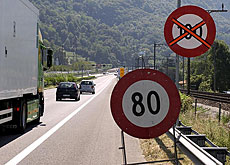
Greens demand action on summer smog

The Green Party is urging the authorities to introduce lower motorway speed limits and provide free public transport to help fight summer smog.
The Greens called a day of action on Wednesday to raise awareness of the fact that legal limits for ozone and dust particles are regularly exceeded.
“The government should urgently reduce speed limits on Swiss motorways from 120 kilometres per hour to 80kmh during the summer months,” the party stated.
A similar measure was successfully introduced to fight winter smog in about half the country’s cantons for five days in February – mainly in the German-speaking part of the country.
Tests showed that smog was reduced on the affected roads by up to ten per cent compared with other places.
The Greens are calling on the authorities to introduce temporary measures at the national, regional and local levels such as providing free public transport, and it wants to see a short-term ban on all diesel vehicles that are not fitted with special filters to help curb dust particle emissions.
In the longer-term, the party is calling for filters to be fitted as standard on cars and trucks and is supporting the introduction of a tax on carbon dioxide emissions, including on petrol and diesel
Ozone
In its statement, the environmental party highlighted comments made by the Federal Commission for Air Hygiene that said up to 300 deaths in the summer of 2003 may have been caused by exposure to high ozone concentrations.
Swiss air quality standards state that an ozone limit value – 120 micrograms per square metre – should only be surpassed once a year.
But the Greens said this value was already exceeded 20 times in June alone, as have levels for fine dust particles.
The Greens also emphasise the damage to the environment – trees, vegetation and farmland – caused by summer smog.
In January the government announced a smog action plan with new measures to improve poor air quality in many Swiss cities aimed at reducing levels of diesel emissions and soot from the burning of wood.
One proposal, which was debated in June, is the introduction of diesel filters.
In a related development, the University of Applied Sciences in Rapperswil announced that it had developed two new air filter products that can drastically reduce nitrogen oxide emissions by trucks by 75 to 90 per cent.
swissinfo with agencies
Summer smog consists of pollutants, mainly ozone, which collect especially during summer months. It is formed when heat from the sun causes ozone to build up at low altitude by combining nitrogen oxides – dust particles – and volatile organic compounds.
At this point, ozone, which is protective in the stratosphere, can be damaging to humans and the environment.
In Switzerland, the ambient air quality standards stipulated in the Ordinance on Air Pollution Control (LRV) are frequently exceeded in the summer months.
The primary sources of nitrogen oxides and volatile organic compounds are road transport and also industry.
The Federal Environment Office says fine particle air pollution is one of the greatest problems facing the environment and people’s health.
It says dust particles cause 3,700 premature deaths in Switzerland a year and annual extra health costs of SFr4.2 billion ($3.4 billion).
Three million people in Switzerland – more than 40% of the population – live in regions that record above-average fine particle levels.

In compliance with the JTI standards
More: SWI swissinfo.ch certified by the Journalism Trust Initiative





























You can find an overview of ongoing debates with our journalists here . Please join us!
If you want to start a conversation about a topic raised in this article or want to report factual errors, email us at english@swissinfo.ch.